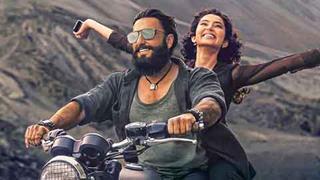Actor Aamir Khan is back again with a period flick, the adversaries remain the same but this time there's no cricket involved.
In Ketan Mehta's Mangal Pandey - The Rising, Aamir and his band of revolutionaries would still be challenging the British but not on the cricket pitch.
The film, set in Barrackpore against the backdrop of the first war of Indian Independence in 1857, may find it difficult to replicate the Oscar glory of Lagaan but Aamir is
keeping his fingers crossed.
"I haven't thought about the Oscars yet. I just want to entertain people. All I know is that when people see this film, they'll know the man behind Mangal Pandey, the starting
point of our freedom struggle," says Aamir.
"It was difficult because very little is known about Pandey. Even so, all the events in the film are based on historical facts," he says. "I even wanted to visit Barrackpore but it
didn't work out. However, Ketan and production designer Nitin Desai did go there for research."
The two-and-half-hour long film, made simultaneously in Hindi and English, will be premiering as the opening film at the Locarno Film Festival in Switzerland on August 3 and
will hit theatres worldwide on August 12.
Produced by Bobby Bedi and Deepa Sahi, Mangal Pandey boasts of an ensemble cast - Aamir, Rani Mukherji, Amisha Patel, Toby Stephens and Kirron Kher.
While Rani enacts the fictional role of a prostitute, Amisha plays a young widow rescued from committing sati by a British officer, portrayed by Toby Stephens of Die
Another Day fame.
Aamir, sans his now famous Mangal Pandey moustache, denies that he has a penchant for enacting patriotic characters.
"That's not true. It cannot be described merely as a patriotic film. It's about the concept of freedom. It might be a period film but it is relevant today at a time when
superpowers like the US are doing the same thing (the Britishers did) in Iraq and Afghanistan.
"I just came across a story which I liked. Moreover, Bhuvan (in Lagaan) and Mangal are totally different characters. Mangal is a hot-headed individual unlike Bhuvan."
According to director Ketan Mehta, the script of the film has changed considerably since he first wrote it in 1988.
"At that time, it was simply a jingoistic, patriotic film. Farrukh Dhondy joined us for the screenplay and now multiple perspectives are coming together," he says.
"We have used Mangal Pandey as a symbol of freedom, representing that section of society whose consciousness had begun to rise. People will now know his contribution
to India's freedom struggle," says Mehta.
For Rani Mukherji, playing the role of a prostitute in the film was a different experience altogether.
"It was difficult because I needed to feel like a woman who came from a different society. I needed to have a sort of fire in my eyes and bold body language," she says.
Playing porstitute was difficult!
Wednesday, July 20, 2005 17:22 IST

















